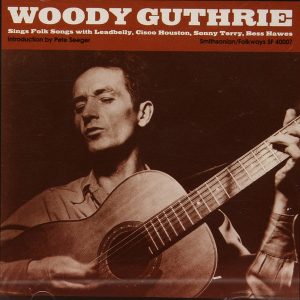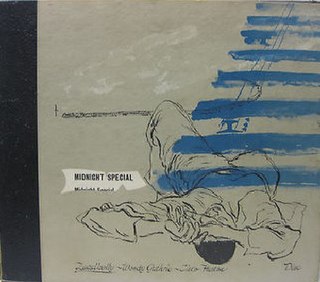
Huddie William Ledbetter, better known by the stage name Lead Belly, was an American folk and blues singer notable for his strong vocals, virtuosity on the twelve-string guitar, and the folk standards he introduced, including his renditions of "In the Pines", "Goodnight, Irene", "Midnight Special", "Cotton Fields", and "Boll Weevil".

Woodrow Wilson Guthrie was an American singer-songwriter and composer who was one of the most significant figures in American folk music. His work focused on themes of American socialism and anti-fascism. He inspired several generations both politically and musically with songs such as "This Land Is Your Land".

Saunders Terrell, known as Sonny Terry, was an American Piedmont blues and folk musician, who was known for his energetic blues harmonica style, which frequently included vocal whoops and hollers and occasionally imitations of trains and fox hunts.

Gilbert Vandine "Cisco" Houston was an American folk singer and songwriter, who is closely associated with Woody Guthrie due to their extensive history of recording together.

Dust Bowl Ballads is an album by American folk singer Woody Guthrie. It was released by Victor Records, in 1940. All the songs on the album deal with the Dust Bowl and its effects on the country and its people. It is considered to be one of the first concept albums. It was Guthrie's first commercial recording and the most successful album of his career.
Smithsonian Folkways is the nonprofit record label of the Smithsonian Institution. It is a part of the Smithsonian's Smithsonian Center for Folklife and Cultural Heritage, located at Capital Gallery in downtown Washington, D.C. The label was founded in 1987 after the family of Moses Asch, founder of Folkways Records, donated the entire Folkways Records label to the Smithsonian. The donation was made on the condition that the Institution continue Asch's policy that each of the more than 2,000 albums of Folkways Records remain in print forever, regardless of sales. Since then, the label has expanded on Asch's vision of documenting the sounds of the world, adding six other record labels to the collection, as well as releasing over 300 new recordings. Some well-known artists have contributed to the Smithsonian Folkways collection, including Pete Seeger, Ella Jenkins, Woody Guthrie, and Lead Belly. Famous songs include "This Land Is Your Land", "Goodnight, Irene", and "Midnight Special". Due to the unique nature of its recordings, which include an extensive collection of traditional American music, children's music, and international music, Smithsonian Folkways has become an important collection to the musical community, especially to ethnomusicologists, who utilize the recordings of "people's music" from all over the world.
"Worried Man Blues" is a folk song in the roots music repertoire. It is catalogued as Roud Folk Song Index No. 4753. Like many folk songs passed by oral tradition, the lyrics vary from version to version, but generally all contain the chorus "It takes a worried man to sing a worried song/It takes a worried man to sing a worried song/I'm worried now, but I won't be worried long." The verses tell the story of a man imprisoned for unknown reasons "I went across the river, and I lay down to sleep/When I woke up, had shackles on my feet", who pines for his lost love, who is "on the train and gone."

American singer-songwriter Woody Guthrie's published recordings are culled from a series of recording sessions in the 1940s and 1950s. At the time they were recorded they were not set down for a particular album, so are found over several albums not necessarily in chronological order. The more detailed section on recording sessions lists the song by recording date.

The Asch Recordings, recorded between 1944 and 1949, are a series of albums featuring some of the most famous recordings of US folk musician Woody Guthrie. These sessions were recorded by Moses "Moe" Asch in New York City.

The Union Boys was an American folk music group, formed impromptu in 1944, to record several songs on an album called Songs for Victory: Music for Political Action. Its "all-star leftist" members were Josh White, Sonny Terry, Brownie McGhee, Pete Seeger, Burl Ives, Tom Glazer.
Roger Sprung was an American banjo player and teacher best known for introducing authentic bluegrass banjo picking styles to the folk music community in the north and for the eclectic manner in which he adapted bluegrass banjo techniques to music of other genres. His 1963 album Progressive Bluegrass may have been the first use of that title, later applied to a subgenre of bluegrass music by him and others.
Folkways Records was a record label founded by Moses Asch that documented folk, world, and children's music. It was acquired by the Smithsonian Institution in 1987 and is now part of Smithsonian Folkways.

Moses Asch was an American recording engineer and record executive. He founded Asch Records, which then changed its name to Folkways Records when the label transitioned from 78 RPM recordings to LP records. Asch ran the Folkways label from 1948 until his death in 1986. Folkways was very influential in bringing folk music into the American cultural mainstream. Some of America's greatest folk songs were originally recorded for Asch, including "This Land Is Your Land" by Woody Guthrie and "Goodnight Irene" by Lead Belly. Asch sold many commercial recordings to Verve Records; after his death, Asch's archive of ethnic recordings was acquired by the Smithsonian Institution, and released as Smithsonian Folkways Records.

Woody Guthrie Sings Folk Songs is a remastered compilation album of American folk songs sung by legend Woody Guthrie accompanied by Lead Belly, Cisco Houston, Sonny Terry, and Bess Lomax Hawes originally recorded for Moses Asch in the 1940s and re-released in 1989 by Folkways Records.

Struggle is an album released by Folkways Records as a vinyl LP in 1976 and as a CD in 1990. It contains recordings by folk artist Woody Guthrie, accompanied on some of the tracks by Cisco Houston and Sonny Terry. Songs on this album are commonly referred to as protest music, songs that are associated with a movement for social change.

My Dusty Road is a 4 CD box set of Woody Guthrie music containing 54 tracks and a book. It is a collection of the newly discovered Stinson master discs. It was released by Rounder Records in 2009.
Jeff Place is the American writer and producer, and a curator and senior archivist with the Smithsonian Center for Folklife and Cultural Heritage. He has won three Grammy Awards and six Indie Awards.

Leadbelly Sings Folk Songs is a remastered compilation album of American folk songs sung by legend Leadbelly accompanied by Woody Guthrie, Cisco Houston, and Sonny Terry, originally recorded by Moses Asch in the 1940s and re-released in 1989 by Folkways Records.

Negro Folk Songs is an album by Lead Belly, recorded in 1943 and released as an album in early 1946.

Midnight Special is an album by Lead Belly, Woody Guthrie, and Cisco Houston, recorded in 1946 and released as an album in 1947.














